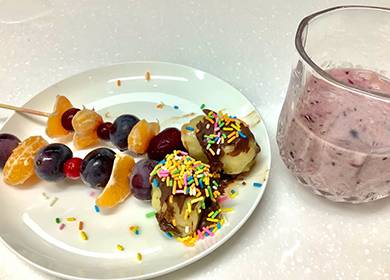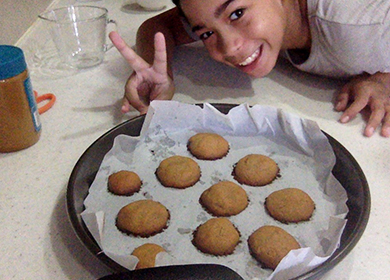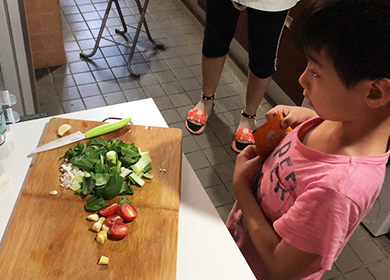Go Back
News
News
Chefs’ Hats Are on at YCIS Beijing Summer Camp
News
07 Aug, 2020
10 : 00
Food, just like music, has the power to unite people in a way that nothing else can. It has been evident in the YCIS Beijing Primary Summer Programme cooking classes, which are 50-minutes sessions led by Ms Freda Humber, Drama Teacher and Bethany Adams, Year 1 Teacher. Both teachers opted to teach a cooking class based on several reasons. The motivation for both, however, was to develop students’ confidence working in the kitchen, introduce them to different flavours and acquire other skills while enjoying their creations.
Although parent supervision and participation are necessary during Ms Adams’ session, due to the young age of her students who are in Years 1 – 3, she encourages that they experiment with other aspects of the process which will develop their knowledge and independence in the kitchen in the future. Some of the concepts and language she introduced to students are related to the equipment used such microwaves, gas hobs, blenders, or even actions they take during the preparation of a meal, such as cutting or stirring of the dishes.
Mathematics is another subject she integrates into her sessions. “Some simple addition, grouping and using the measurements that students were doing at school helps them to continue to develop these skills in real-life practical settings” through cooking, she stated.
Role-playing as chefs was already a part of Ms Humber’s online drama lessons during May; therefore, the cooking sessions have been an apt extension of those classes. Her current students are in Years 4-6, and she shared that her decision to choose to offer the cooking sessions was motivated not only by her love for culinary and creating but also her desire for students to get to know her multifaceted nature.
Most importantly, she wanted to impart a fundamental lesson of self-sufficiency to young learners. She explains that ‘not everything children eat has to be extensively prepared, but they can learn to prepare simple dishes without parents’ thorough involvement in some cases.”
When choosing recipes, it was important for Ms Humber to consider the ease with which dishes would be created and how accessible ingredients were. That is why peanut butter and bananas were her key ingredients. With these, she baked peanut butter cookies, banana bread and made banana sushi rolls, amongst other creations.
For Ms Adams on the other hand, the recipes needed to be diverse enough to allow students to experiment with their palates and use different methods of cooking. The recipes she introduced to students range from a vegetable noodle soup, flapjacks, cake in a cup and vegetable and cheese wraps.
Although seeing the final product ignites a great sense of accomplishment amongst students, the process of creating has become enjoyable for them according to their teachers. “We break up everything into easy steps, so it’s quite exciting because it has shown them that it’s something they can do,” said Ms Adams.
The ease was displayed during Ms Humber’s lesson where students were encouraged to develop a signature smoothie. “It allows students some creativity and ownership of their creations. It is also the best way for them to learn through trial and error,” she said.
With reflections after each meal and positive feedback from parents, the summer programme cooking class is proving to be a real hit, and we are looking forward to more dishes from our mini chefs in the coming weeks.
To try recipes from Ms Adams and Ms Humber, click here.












